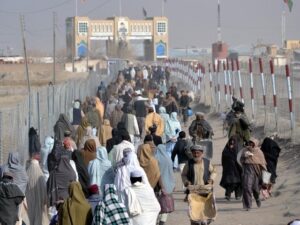by Muneeb -Ur- Rahman 2 June 2022
Today, Afghans make up the largest refugee group in the world and Pakistan hosts the world’s second largest number of refugees in its territory. An estimated 3.5 million Afghan refugees are present in Pakistan since 1980s, half of which are registered, and it is speculated that about equal number of them are living unregistered. These refugees who hail from Afghanistan were once the victims of human rights violations and had been living in the state of great crisis in the 1980s in their homeland Afghanistan.
Pakistan has been graciously hosting the Afghan Refugees for past many decades, but it still comes under fire for not welcoming more refugees into its territory. This piece highlights the humanitarian efforts made by the people and state of Pakistan, despite its own limitations as a developing country with a struggling economy. The first influx of Afghan refugees seeped into Pakistan in the 1980s when the USSR invaded Afghanistan. Later the withdrawal of the USSR in 1988 resulted in a civil war in Afghanistan when another mass exodus of Afghans to Pakistan took place. This all was followed by another refugee influx in 2001 after the United States- led war on terror in Afghanistan. Now, after the recent US withdrawal from Afghanistan, a new influx of Afghan refugees is expected. The inter-ministerial committee has estimated that around 500,00 to 700,000 more Afghan refugees might come to Pakistan after the recent US withdrawal from Afghanistan.
It should be noted that the highly educated and affluent of these Afghans mostly migrate to Europe, the US, and even Australia whereas the ones migrating to Pakistan and Iran are mostly middle-class or lower middle class. Some refugees in Pakistan choose to live in refugee camps while others avoid those camps as data indicates that about 68% of these Afghan refugees in Pakistan live in the urban areas of the country while only 32% live in the refugee camps. This is simply because they have relatives in relatively better areas of the country so instead of staying in the camps such refugees move to these urban centers of Pakistan.
The wealthy Afghan refugees living in different cities of Pakistan own houses, cars, and do white collar jobs or run their own personal businesses. They have enrolled their children in high standard schools in Pakistan. The self-employed refugees in Pakistan own restaurants, carpet businesses and bakeries (making and selling Afghan bread) or run small shops. Some of the Afghan refugees living in Pakistan are also involved in Pakistani media and entertainment industry. Najiba Faiz is one such example who is a well-known television channel host and actor. She belongs to the Kunduz province of Afghanistan.
Pakistan gained considerable recognition from most of the human rights organizations of the world including the UNHCR for its open border initiatives in the early years of Afghan refugee’s influx to Pakistan. The international aid including the one from the World Food Program and UNHCR`s food aid was suspended in 1995. Furthermore, the flow of international financial help dropped from $24 million in 2000, to $18 million in 2002 – leaving a significant funding gap on financial requirements of refugees in Pakistan. On the other hand, after joining the US war on terror in Afghanistan the economic losses of Pakistan have exceeded $150 billion apart from the investment and tourism dips.
The Afghan refugees continue to migrate to Pakistan which itself is a developing country, having a struggling economy. The country is already facing a high unemployment rate, with very limited opportunities to basic services, including education, health and livelihood. About 4 million youth of the country enter into job market every year, demanding an additional 1.5 million jobs to be created each year. These all factors are changing the attitudes of some Pakistanis towards accepting further Afghan refugees. On the economic grounds few of the Pakistani politicians claim that many jobs in Pakistan are taken by the Afghan refugees which has deprived Pakistanis from those jobs in their own country.
Pakistan is not a signatory to Refugees Convention of 1951 or the Protocol of 1967. One may argue that previously Pakistan was considered as a non-NATO ally of the US, so its humanitarian efforts were recognized internationally. Now instead of realizing the situation and helping Pakistan and Afghan Refugees in their resettlement, the west is blaming Pakistan for not giving a warm welcome to Afghan Refugees. This can also be due to the changing narrative of Pakistan from US policy “Do More” to its own policy of “Absolutely Not.”
At present, Afghans are in search of food and safety, facing the worst famine. They are selling their kidneys to survive and even then; their accounts lie frozen. The main responsibility lies on developed and wealthier states, including the US to accept the flux of the refugees into their countries. On the other hand, the international community could also make arrangements for keeping these displaced Afghans inside Afghanistan. Instead of pushing the displaced Afghans to a country which does not have the capacity to host more refugees. Pakistan`s own economy has serious constraints and is not really in a position to deal with refugees’ issue alone. Pakistan needs the help of international community to permanently resolve the Afghan refugees’ issue and to make efforts for their resettlement. Therefore, the international community must realize the nature of this grave reality and should come forward to protect the rights of these refugees by assisting government of Pakistan in its efforts to meet the needs of Afghan refugees.

